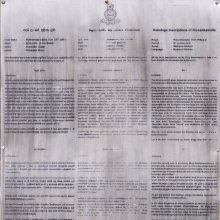Simhapura, Siṃhapura, Sinhapura, Simha-pura: 14 definitions
Introduction:
Simhapura means something in Hinduism, Sanskrit, Jainism, Prakrit, the history of ancient India. If you want to know the exact meaning, history, etymology or English translation of this term then check out the descriptions on this page. Add your comment or reference to a book if you want to contribute to this summary article.
Images (photo gallery)
In Hinduism
Purana and Itihasa (epic history)
Source: archive.org: Puranic EncyclopediaSiṃhapura (सिंहपुर).—A city in Bhārata, famous in the Purāṇas. This city was situated in the mountainous region of North India. During the period of Mahābhārata, Citrāyudha was the king who ruled over this city. (Mahābhārata, Sabhā Parva, Chapter 27, Verse 20). Arjuna during his regional conquest of the North, defeated this king.
Source: JatLand: List of Mahabharata people and placesSiṃhapura (सिंहपुर) is a name mentioned in the Mahābhārata (cf. II.24.19) and represents one of the many proper names used for people and places. Note: The Mahābhārata (mentioning Siṃha-pura) is a Sanskrit epic poem consisting of 100,000 ślokas (metrical verses) and is over 2000 years old.

The Purana (पुराण, purāṇas) refers to Sanskrit literature preserving ancient India’s vast cultural history, including historical legends, religious ceremonies, various arts and sciences. The eighteen mahapuranas total over 400,000 shlokas (metrical couplets) and date to at least several centuries BCE.
In Jainism
General definition (in Jainism)
Source: archive.org: TrisastisalakapurusacaritraSiṃhapura (सिंहपुर) is the name of an ancient city, according to chapter 4.1 [śreyāṃsanātha-caritra] of Hemacandra’s 11th century Triṣaṣṭiśalākāpuruṣacaritra: an ancient Sanskrit epic poem narrating the history and legends of sixty-three illustrious persons in Jainism.
Accordingly:—“Now in this very Jambūdvīpa there is a city named Siṃhapura, like a jeweled anklet of the earth, the ornament of Bharatakṣetra. The jeweled roofs of its houses, reflecting the stars, have the appearance of a dice board spotted with dice on it. Clouds resting on the high terraces of its walls look like tilakas of collyrium made for protection of the eyes. A music-festival for the goddess Śrī is held continuously in the houses of its rich men in the form of the tinkling of women’s beautiful foot-ornaments. When it rains, the streams of its houses carry away jewel-dust and reach an equality with the ocean”.

Jainism is an Indian religion of Dharma whose doctrine revolves around harmlessness (ahimsa) towards every living being. The two major branches (Digambara and Svetambara) of Jainism stimulate self-control (or, shramana, ‘self-reliance’) and spiritual development through a path of peace for the soul to progess to the ultimate goal.
India history and geography
Source: Wisdom Library: India HistorySiṃhapura (सिंहपुर) is the name of an ancient city of the Kaliṅga country, according to the Mahāvastu, Senart’s Ed., p. 432. Siṃhapura is probably identical with Singupuram near Chicacole.
Source: archive.org: Personal and geographical names in the Gupta inscriptionsSiṃhapura (सिंहपुर) is a place name ending in pura mentioned in the Gupta inscriptions. Siṃhapura is also known as Siṅgur in the way that pura is changed to ur.
Source: Wikipedia: India HistorySinhapura (Sanskrit: Siṃhapura) was the capital of the legendary Indian king Sinhabahu. The name is also transliterated as Sihapura or Singhapura. The location of Sinhapura is disputed with some scholars stating the city was located in eastern India. According to Niraj et al Sinhapura is located in north west India. The city is linked to the origin of the Sinhalese people and Sinhalese Buddhist ancient texts.
Source: academia.edu: The Chronological History of Ancient Sri LankaSimhabahu became the king of Lāta country and built a city named Simhapura. Most probably, Simhabahu built his capital Simhapura close to modern Girnar city of Gujarat. Girnar was known as Raivata or Urjayanta in ancient times. The lion (Simha) of Girnar became the symbol of the royal power of Simhabahu.
Source: What is India: Epigraphia Indica volume XXXI (1955-56)Siṃhapura is the name of an ancient city mentioned in the “Pedda-Dugam plates of Śatrudamana” (5th century A. D.). Siṃhapura has been identified with modern Singupuram near Srikakulam. It is well known that Siṃhapura is mentioned as the capital of the Kaliṅga country in the Ceylonese chronicles and that many Mahārājas enjoying the title Kaliṅga-ādhipati or sakala-Kaliṅg-ādhipati, who flourished about the fifth century A.D., issued their charters from the same place.
Kings Umavarman and Chaṇḍavarman of the Pitṛbhakta family had one of their capitals at Siṃhapura. The Mahārājas of the Siṃhapura region must have thrown off the Gupta yoke considerably before the end of the fifth century not long after Śatrudamana’s reign.
These plates (mentioning Siṃhapura) were discovered in the course of digging the earth for the foundation of a house at the village of Pedda-Dugam in the Narasannapet Taluk of the Srikakulam District, Andhra State. It was issued to the villagers headed by Brāhmaṇas and others, residing at the three localities called Duhāgrāma, Vasuvāṭaka and Govāṭaka.
Source: Jainworld: Jain History (h)Siṃhapura (सिंहपुर) or Siṃhapuri is the place, where according to the Jaina tradition, the 11th Tīrthānkara Śreyāṃśa was born. There is a controversy among scholars about the identification of this place. Some identify this place with Sārnāth. The evidence of Yuan Chwang seems to suggest that this place is identical with Siṃhapura, situated in the salt range (Punjab, Pakistan), which has been described by that pilgrim as connected with a 'founder' of the 'White-Cloth' sect.
Source: OpenEdition books: Vividhatīrthakalpaḥ (History)Siṃhapura (सिंहपुर) is the name of an ancient locality, associated with a traditional pilgrimage route, as is mentioned in the Vividhatīrthakalpa by Jinaprabhasūri (13th century A.D.): an ancient text devoted to various Jaina holy places (tīrthas).

The history of India traces the identification of countries, villages, towns and other regions of India, as well as mythology, zoology, royal dynasties, rulers, tribes, local festivities and traditions and regional languages. Ancient India enjoyed religious freedom and encourages the path of Dharma, a concept common to Buddhism, Hinduism, and Jainism.
Languages of India and abroad
Sanskrit dictionary
Source: Cologne Digital Sanskrit Dictionaries: Edgerton Buddhist Hybrid Sanskrit DictionarySiṃhapura (सिंहपुर) or Siṃhapurī.—(1) °ra, name of a city, in the Kiṃnarī Jātaka: Mahāvastu ii.95.5; 98.1 ff.; (2) °ra, name of a city in the Kaliṅga country: Mahāvastu iii.432.14; (3) °rī, name of the capital city (rājadhānī) of Śākyamuni (3), q.v.: Mahāvastu iii.238.11.
Source: Cologne Digital Sanskrit Dictionaries: Cappeller Sanskrit-English DictionarySiṃhapura (सिंहपुर).—[neuter] [Name] of a town.
Source: Cologne Digital Sanskrit Dictionaries: Monier-Williams Sanskrit-English DictionarySiṃhapura (सिंहपुर):—[=siṃha-pura] [from siṃha] n. Name of a town (Singapur), [Mahābhārata; Buddhist literature etc.]
[Sanskrit to German]
Sanskrit, also spelled संस्कृतम् (saṃskṛtam), is an ancient language of India commonly seen as the grandmother of the Indo-European language family (even English!). Closely allied with Prakrit and Pali, Sanskrit is more exhaustive in both grammar and terms and has the most extensive collection of literature in the world, greatly surpassing its sister-languages Greek and Latin.
See also (Relevant definitions)
Starts with: Simhapuraka.
Ends with: Narasimhapura.
Full-text (+7): Sihapura, Singhapura, Simhapuri, Nissanka Malla, Simhapuraka, Singur, Sucandrima, Vajranayana, Simhabahu, Vidyullata, Prabhanjanavarman, Agnisharman, Shatrudamana, Surya, Ratnamalin, Suryanjaya, Shaktivarman, Anantashaktivarman, Vishnuraja, Yelamanchili.
Relevant text
Search found 14 books and stories containing Simhapura, Siṃhapura, Sinhapura, Simha-pura, Siṃha-pura, Sinha-pura; (plurals include: Simhapuras, Siṃhapuras, Sinhapuras, puras). You can also click to the full overview containing English textual excerpts. Below are direct links for the most relevant articles:
Dipavamsa (study) (by Sibani Barman)
Buddhist records of the Western world (Xuanzang) (by Samuel Beal)
Chapter 4 - Country of Sang-ho-pu-lo (Simhapura) < [Book III - Eight Countries]
Chapter 3 - Country of Ta-ch’a-shi-lo (Takshashila) < [Book III - Eight Countries]
Chapter 1 - Country of Sang-kia-lo (Simhala) < [Book XI - Twenty-three Countries]
Impact of Vedic Culture on Society (by Kaushik Acharya)
Sanskrit Inscriptions (B): The Maitrakas < [Chapter 3]
Land donation < [Chapter 5]
Chart: Movement of Vedic Brāhmaṇas < [Chapter 3]
Trishashti Shalaka Purusha Caritra (by Helen M. Johnson)
Part 17: Previous births of Daśaratha < [Chapter IV - The, birth, marriage, and retreat to the forest of Rāma and Lakṣmaṇa]
Part 4: Birth of Prahlāda < [Chapter V - Dattanandanaprahlādacaritra]
Part 2: Incarnation as Śreyāṃsa (introduction) < [Chapter I - Śreyāṃsanāthacaritra]
Jain Remains of Ancient Bengal (by Shubha Majumder)
The twenty-four Tīrthaṅkaras and their Yakṣas and Yakṣiṇīs < [Chapter 6 - Iconographic Study of Jaina Sculptural Remains]
The Mahavastu (great story) (by J. J. Jones)

